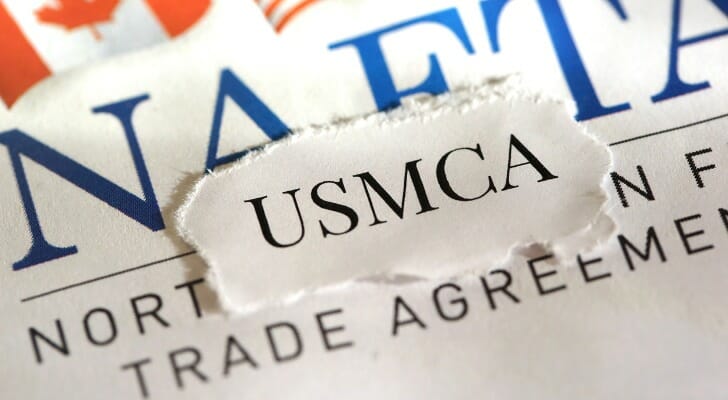Understanding the USMCA, the New NAFTA
NAFTA is dead. Long live NAFTA! In 2018 and 2019, the Trump administration announced that it had signed a renegotiated version of the North American Free Trade Agreement. The administration tried to rebrand the deal, the...Saturday, March 14th 2020, 4:02 pm
By Eric Reed
 NAFTA is dead. Long live NAFTA! In 2018 and 2019, the Trump administration announced that it had signed a renegotiated version of the North American Free Trade Agreement. The administration tried to rebrand the deal, the USMCA, and claim credit. But this deal isn’t new or revolutionary.
NAFTA is dead. Long live NAFTA! In 2018 and 2019, the Trump administration announced that it had signed a renegotiated version of the North American Free Trade Agreement. The administration tried to rebrand the deal, the USMCA, and claim credit. But this deal isn’t new or revolutionary.
Labor Law Amendments
One goal of the Trump administration was to update NAFTA. That treaty created a trade zone joining the U.S., Canadian and Mexican economies. The new agreement, the United States-Mexico-Canada Agreement (USMCA), made a few tweaks to NAFTA. However, the new updates exist to protect U.S. workers against competition. They are particularly hostile toward low-cost labor in Mexico.
When NAFTA took effect in 1994 it transformed many parts of the U.S. economy. It opened opportunities for business to seek inexpensive labor. It also reduced prices for consumers and created open access to products (particularly produce) from all three economies. The USMCA updates and modernizes NAFTA.
The new treaty includes an agreement from Mexico to increase its legal protections for unionization and collective bargaining. This will make labor comparatively cheaper in the United States. It reduces the quality of jobs available to American workers relative to Mexican workers. Current U.S. labor policy has dramatically cut the same protections for unionization and collective bargaining domestically.
In addition the new treaty requires that between 40% and 45% of all auto parts be made by workers making at least $16 per hour U.S. before a car will qualify for tariff-free import. This provision is particularly aimed at low-cost labor market in Mexico. New workers in a U.S. auto plant can expect to make between $14 and $20 per hour.
This section also updates the “country of origin rule.” That rule prevents third parties from taking advantage of the trade zone by setting a minimum percent of each car that must be made in the U.S., Mexico or Canada in order to qualify for tariff free passage across the border. Under NAFTA this was 62.5%. The USMCA raises this to 70%.
Intellectual Property Intellectual property has been a key issue in modern trade agreements for the United States. The U.S. has shifted from a production economy to a knowledge and services economy. As a result, trade agreements seek protections for the patents, art and sciences that U.S. companies increasingly export.
Intellectual property has been a key issue in modern trade agreements for the United States. The U.S. has shifted from a production economy to a knowledge and services economy. As a result, trade agreements seek protections for the patents, art and sciences that U.S. companies increasingly export.
The USMCA updates intellectual property sections by requiring that Mexico and Canada give U.S. companies and IP holders the same protections that they give to domestic creators. It also requires both countries to recognize U.S. copyright terms. Those rules dictate that a work retains its copyright for 70 years after the death of the author.
Copyright law may change in the near future. Historically, Congress has periodically expanded the reach of copyright law at the request of the Disney Corporation to make sure that Mickey Mouse never falls into the public domain. At time of writing, the copyright on Mickey Mouse’s first appearance in Steamboat Willie is scheduled to expire on January 1, 2024. It is likely that Congress will expand the term of copyright protection before then.
The law also requires that Mexico and Canada establish patent systems for U.S. companies consistent with U.S. practices. It also requires that both countries establish the same safe harbor provisions that the U.S. uses to shield technology companies from liability based on the content their users create.
Minor ChangesThe USMCA also made a host of small changes to trade among the U.S., Canada and Mexico. These include:
- Increasing access to the Canadian dairy market for U.S. farmers. Specifically, it eliminates tariffs on U.S. dairy imports worth up to 3.6% of the Canadian dairy market.
- Updating technology and intellectual property sections to include technologies that did not meaningfully exist when NAFTA was signed. That includes electronic books, digital music and media, streaming media and online commerce.
- Promising (albeit informally, though the Trump administration) to exempt Canada and Mexico from its ongoing trade wars in exchange for their agreement to this update.
- Requiring all three countries to institute criminal penalties for certain forms of cyber theft and copyright violations.
- A sunset clause which subjects the entire deal to review in six years and expiration in 16 years if not renewed.
 The USMCA is formally a new trade agreement. However, it is in practice nothing more than an update to the aging NAFTA. It includes provisions for new technologies, updated labor practices and significant protections for U.S. intellectual property holders. Those difference may affect your investments.
The USMCA is formally a new trade agreement. However, it is in practice nothing more than an update to the aging NAFTA. It includes provisions for new technologies, updated labor practices and significant protections for U.S. intellectual property holders. Those difference may affect your investments.
- Trade agreements come and go, but your retirement account needs to be around forever. Finding the right financial advisor that fits your needs doesn’t have to be hard. SmartAsset’s free tool matches you with financial advisors in your area in 5 minutes. If you’re ready to be matched with local advisors that will help you achieve your financial goals, get started now.
- The North American Free Trade Agreement has never been without controversy. There are pros and cons of NAFTA that translate to the USMCA as well. You may want to familiarize yourself with some of the intricacies if you invest in foreign companies.
Photo credit: ©iStock.com/Kameleon007, ©iStock.com/wildpixel, ©iStock.com/Evgeny Gromov
The post Understanding the USMCA, the New NAFTA appeared first on SmartAsset Blog.
Information contained on this page is provided by an independent third-party content provider. Frankly and this Site make no warranties or representations in connection therewith. If you are affiliated with this page and would like it removed please contact pressreleases@franklymedia.com
More Like This
March 14th, 2020
December 13th, 2024
December 13th, 2024
December 13th, 2024
Top Headlines
December 13th, 2024
December 13th, 2024
December 13th, 2024
December 13th, 2024







